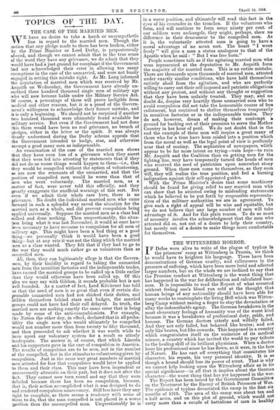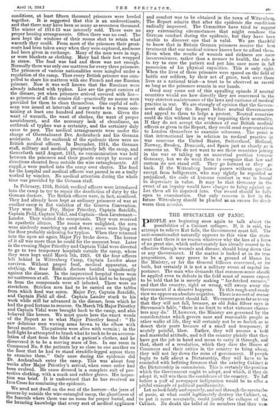THE WITTENBERG HORROR.
IF Defoe were alive to write of the plague of typhus in the prisoners' camp at Wittenberg in Prussia, we think he would have to heighten his language. There have been demonstrations of German cruelty, and callousness in the presence of suffering, which have been more lurid and affected larger numbers, but on the whole we are inclined to say that the Prussian conduct at Wittenberg is the worst thing that has happened in the war for deliberation and calculated base- ness. It is impossible to read the Report of what occurred without feeling one's blood run cold at the thought that human beings of any nationality should have been able for many weeks to contemplate the living Hell which was Witten- berg Camp without raising a finger to stay the devastation or allay the indescribable agony. The German breakdown in the most elementary feelings of humanity was of the worst kind because it was a breakdown of professional duty, pride, and honour. The German doctors utterly and wilfully failed. And they not only failed, but behaved like brutes; and not only like brutes, but like cowards. This happened in a country which congratulates itself on the eminence of its medical science, a country which has invited the world to pay tribute to the healing skill of its brilliant physicians. When a doctor loses his professional sense he has flown, as it were, in the face of Nature. He has cast off everything that constitutes his character, his repute, his very personal identity. It is as though a hound should lose its power of scent. That is why we cannot help looking upon the Wittenberg affair as in its special significance—in all that it implies about the German character—the worst thing that has yet happened in the war. The Report has been issued by the Government Committee on the Treatment by the Enemy of British Prisoners of War. The epidemic of typhus devastated the camp in the first six months of 1915. The area of the camp was about ten and a half acres, and on this plot of ground, which would not carry more than a couple of battalions of men in healthy conditions, at least fifteen thousand prisoners were herded together. It is suggested that this is an underestimate, and that there may have been as many as seventeen thousand. The winter of 1914-15 was intensely cold. There were no proper heating arrangements. Often there was no coal. The men kept the windows of their rooms shut to retain what warmth they could. From most of the prisoners their great- coats had been taken away when they were captured, and none had been given in exchange. Many of the men were in rags, or wore blankets as clothing. Many had their feet wrapped in straw. The food was bad and there was not enough. Normally there was only one mattress for every three prisoners. The prisoners of various nationalities were mingled under a regulation of the camp. Thus every British prisoner was com- pelled to share his mattress with one French and one Russian prisoner. Now it 'was well known that the Russians were already infected with typhus. Lice are the great carriers of the disease, yet when prisoners arrived covered with lice— as prisoners of all the armies did—practically no means were provided for them to clean themselves. One cupful of soft- soap was issued at intervals of many weeks to a room con- taining at least one hundred and twenty men. Given the want of warmth, the want of clothes, the want of proper nourishment, and the necessary lack of cleanliness, an outbreak of typhus was a certainty, and the certainty duly came to pass. The medical arrangements were under the charge of Oberstabsarzt Der. Aschenbach and his German assistants. At the outbreak of the epidemic there were no British medical officers. In December, 1914, the German staff, military and medical, precipitately left the camp, and thenceforth until August, 1915, no communication was held between the prisoners and their guards except by means of directions shouted from outside the wire entanglements. All suppli,:a were pushed into the camp over chutes. The food for the hospital and medical officers was passed in on a trolly worked by winches. No medical attention during the whole time was provided by the German staff.
In February, 1915, British medical officers were introduced into the camp to try to repair the dereliction of duty by the German doctors. The British officers were, in fact, sacrificed. They had already been kept as ordinary prisoners of war at another camp in flat violation of the Geneva Convention. They were Major Fry, Major Priestley, Captain Sutcliffe, Captain Field, Captain Vidal, and Captain—then Lieutenant— Lauder. They visited the compounds. They were received in apathetic silence. The rooms were unlighted, the men were aimlessly marching up and down ; some were lying on the floor probably sickening for typhus. When they returned into the open air again Major Fry broke down. The horror of it all was more than he could for the moment bear. Later in the evening Major Priestley and Captain Vidal were directed to go to two temporary hospitals outside the camp, where they were kept until March 7th, 1915. Of the four officers left behind in Wittenberg Camp, Captain Lauder alone survives. Without proper food, medical apparatus, or clothing, the four British doctors battled magnificently against the disease. In the improvised hospital there were no'mattresses at all. The mattresses which had to be brought in from the -compounds were all infected. There were no stretchers. Stricken men had to be carried on the tables from which food was eaten. Major Fry, Captain Sutcliffe, and Captain Field all died. Captain Lauder stuck to his work while still far advanced in the disease, from which he had the good fortune to recover. On March 7th Major Priestley and Captain Vidal were brought back to the camp, and also behaved like heroes. We must quote here the exact words of the Report as to what Major Priestley found : "He saw delirious men waving arms brown to the elbow with faecal matter. The patients were alive with vermin ; in the half-light he attempted to brush what he took to be an accumu- lation of dust from the folds of a patient's clothes, and he discovered it to be a moving mass of lice. In one room in Compound No. 8 the patients lay so close to one another on the floor that he had to stand straddle-legged across them to examine them." Only once during the epidemic did Dr. Aschenbach enter the camp. This was about four weeks after Major Priestley's arrival, when some order had been evolved. He came dressed in a complete suit of pro- tective clothing, with a mask and rubber gloves. His inspec- tion was brief. It is understood that he has received an Iron Cross for combating the epidemic.
We need not dwell on the rest df the horrors—the jeers of passers-by outside the wire-entangled camp, the ghastliness of the funerals where there was no room for proper burial, and the haunting knowledge that every sort of medical appliance and comfort was to be obtained in the town of Wittenberg.. The Report admits that after the epideinic . the conditionc radically improved. The Committee have tried to suggest any extenuating circumstances that might condone -the German conduct during the epidemic, but they have been unable to discover one that is valid. We are thankftf to know that in Britain German prisoners receive the• best treatment that our medical science knows how to afford them. Even when the results of wounds and sickness are mere inconveniences, rather than a menace to health, the rule- is to try to cure the patient and put him once more in fel possession of his physical capacities. This is only right. When the lives of these prisoners were spared on the field.of battle our soldiers, by their act of grace, took over those lives as a national trust—a trust to be observed as sacred so long as the prisoners remain in our hands. '.
Good may come out of this appalling episode if neuttal countries would see how directly they are concerned in the very strictest maintenance of the laws and customs of medical practice in war. We are strongly of opinion that the Govern-- . ment should lay the Report before neutral Governments and appeal to them to lodge a protest. Neutral countries could do this without in any way impairing their neutrality. If they do not accept the evidence of our British medical officers as given in the Report, they could send representatives to London themselves to examine witnesses. The point is that international law in relation to medical practice .in war concerns the United States, Switzerland, - Holland. Norway, Sweden, Denmark, and Spain just as closely as it concerns us. We do not want to see these countries joining in the war or taking up an unneutral position towards. Germany, but we do want them to recognize that law an4 custom do not stand still. They go forward or they go back. If the Wittenberg horror passes without questior except from belligerents, who may rightly be regarded as prejudiced, the code of humane conduct in war is bound to depreciate in value. It may be that Germany in the event of an inquiry would have charges to bring against us. Let them all be inquired into. Our record should be fulls- open to examination. Our only concern is lest in the future Wittenberg should be pleaded as an excuse for (keit worse than murder.































 Previous page
Previous page